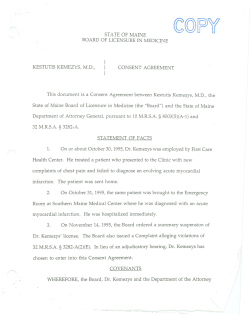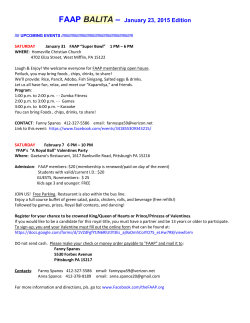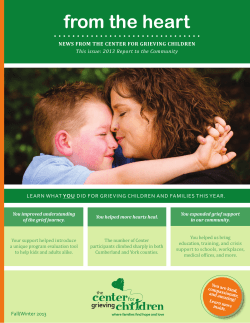
The Maine Chapter of the American Academy of Pediatrics is...
Maine Chapter Maine Chapter 160 Fifth St Auburn, ME 04210-6717 Phone: 207/782-0856 Fax: 866/286-3818 E-mail: agridleyentwood@aap.net Maine Chapter Executive Committee President Jonathan Fanburg MD MPH FAAP Vice President Steve Feder DO FACOP FAAP Secretary-Treasurer Dan Hale MD FAAP Maine Chapter Board Donald Burgess MD FAAP Daniel Cox DO, Resident Joan Dupont DO, Resident John J. Hagerty III MD FAAP Robert Holmberg MD MPH FAAP Jennifer Jewell MD FAAP Larry Losey MD FAAP Stephen Meister MD MHSA FAAP Janice Pelletier MD FAAP Lisa Ryan DO FAAP Sydney Sewall MD MPH FAAP Eddie Silco, Medical Student Sheena Whittaker MD FAAP Chapter Executive Director Aubrie Entwood Chapter Web site www.maineaap.org AAP Headquarters 141 Northwest Point Blvd Elk Grove Village, IL 60007-1098 Phone: 847/434-4000 Fax: 847/434-8000 E-mail: kidsdocs@aap.org www.aap.org The Maine Chapter of the American Academy of Pediatrics is OPPOSED to LD 31, (An Act To Protect the Safety of Maine Children by Requiring the Express Consent of a Legal Guardian To Dispense Prescription Medication to a Minor) As a group, we represent over 200 of Maine’s pediatricians and over 200,000 of Maine’s children and adolescents. I write this testimony as the president of the chapter, as a pediatrician, as an adolescent medicine specialist, and as a parent of a teenager. By law, minor’s in Maine can seek confidential treatment for sexually transmitted diseases, pregnancy, substance abuse, and mental health concerns. The reason such confidentiality is permitted by many states in the US, including Maine, is because: 1. Some teenagers won’t discuss these issues with their doctor if confidentiality is not provided. 2. Some teenagers won’t seek care for these issues if confidentiality is not provided. 3. And some teenagers will allow illnesses to progress to sicker stages before seeking care if confidentiality is not provided, resulting in greater morbidity, mortality, and health care costs. If LD 31 is passed, we predict that Maine will see the following: 1. Fewer teenagers willing to talk about risky behaviors with their doctor. 2. More pregnant teenagers, because they could not get contraception without parent permission. 3. Decreased early prenatal care for pregnant teenagers who were fearful of broken confidentiality. 4. Substance abuse teenagers coming into health care at a more progressed state. 5. More teenagers not getting treated for sexually transmitted infections until the infection has progressed, resulting in greater chance of sterility, systemic spread, and partner spread. 6. Depression and anxiety going untreated among some teenagers. As a parent, we all believe that there is no one better to help our teenager through tough health decisions such as what to do when pregnant, whether to use contraception, what to do about substance abuse, and what to do with depression and anxiety. However, this law does not promote parental-child relationships. It promotes greater barriers to teenagers getting the health care that they need. As a parent, our PRIMARY desire ought to be that our teenagers get treated for the illness they have. As doctors, we see teenagers who don’t want their parents aware of some of the above health issues. They are the exception to the rule, and exist more so in families in which the parent and teenager have not developed an open talking relationship. The doctor must determine if the teenager is capable of consent (weighing out the risks and benefits of a treatment) prior to prescribing a treatment. Many doctors will still encourage a minor to involve a parent, even if it is after a medication is started. It is a rare teenager who won’t talk with a parent after all of these steps. Lastly, if this law is passed, what happens to the teenager who wants to be treated for substance abuse, but the parent does not give permission? What happens to the teen who doesn’t want to get pregnant and the parent refuses contraception? What happens to the teen who is pregnant and wants prenatal vitamins or folic acid for a healthy pregnancy and the parent refuses such care? If parents want to be involved with their teenager’s health, they need to first get involved with the teen’s life long before risk taking behaviors begin. Unfortunately, this proposed legislation will not stop teen sexuality, substance abuse, or depression/anxiety, it will just hinder its treatment. The Maine Chapter of the American Academy of Pediatrics is against LD 31. Jonathan Fanburg, MD, MPH, FAAP Pediatrician, Adolescent Medicine Specialist President, Maine Chapter of the American Academy of Pediatrics
© Copyright 2025





















